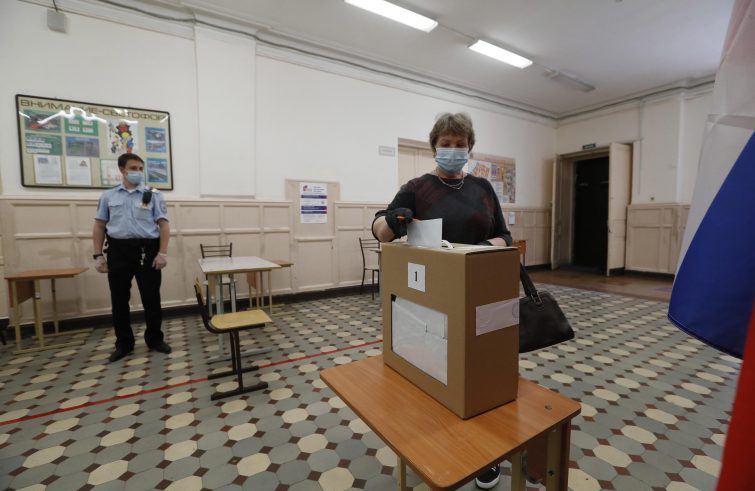
Polls opened in Russia on Thursday June 25 for a week-long vote in-person and online (until July 1st, ) for a referendum on a package of some 200 comprehensive – and complex -constitutional amendments. With no doubt the most important amendment is the one that – if the yes-vote wins – could see Vladimir Putin stay in power for another two terms beyond 2024, until 2036 (when he will be 83 years old). The referendum was scheduled to take place in April, but the Covid emergency caused a postponement of the vote, now spread over several days and with the possibility of online voting to avoid crowds at polling stations. SIR interviewed Eleonora Tafuro Ambrosetti, researcher at the Institute for International Policy Studies Centre for Russia, Caucasus and Central Asia (ISPI).
 What is at stake in the referendum?
What is at stake in the referendum?
It is the conclusion of a process for defining constitutional reform that has lasted months on end. Besides the political amendments announced by Putin in January, others were proposed in March, such as the one by MP Valentina Tereškova, who requested that Putin’s presidential term be count back to zero, making him eligible for re-election until 2036. The package in fact includes the most diverse aspects, from amendments that protect Russian territorial integrity – supported by the Russian nationalists, some of whom fear that Crimea will be “demanded back”, with others concerned for the dispute with Japan over the Kuril Islands – to amendments that appeal to the Russian conservative religious zeal, such as the one that defines marriage as a union between two people of the opposite sex, thereby blocking the possibility of same-sex marriages. These types of amendments are less substantial than those on more purely political issues. We see this referendum as one that could allow Putin to remain in power. But he is also working to strengthen some other institutions, such as the Council of State or Parliament.
Are the Russians prepared for this vote and the online mode?
The online vote is allowing flexibility, but it is feared that it may just be an excuse to enable irregularities, which have already been reported, not only by individual citizens but also through official data. For example, in some polling stations in Moscow the number of electronically registered voters exceeds the number of voters in the electoral register. This raises doubts as to whether the online mode, rather than a matter of safety, serves to ensure the end result. As analysts, we call it a plebiscite rather than a referendum. Also because the magnitude and complexity of the reforms is hard to understand. A recent poll found that more than 65% of Russians fail to understand the reforms they are going to vote on. Another survey conducted by Vciom, close to the Kremlin, showed that Russians don’t trust the voting procedures and are sure that the results will be rigged. Analysts are pretty sure of the result.
The Covid-19 crisis is also affecting Russia, but according to official data there are approximately 635,000 cases of infection with just over 9,000 deaths since January. What is the real situation in the country, also from an economic point of view?
The truthfulness of official Covid data is often questioned also by Russian analysts who noted some “odd” figures. A colleague told me that in Sevastopol there are always four people infected every day, and however much one may believe in coincidences, it seems strange. Indeed, when you look at the numbers, there are justifiable doubts. With regard to mortality figures, even the WHO voiced some doubts, although the reliability of the data on mortality from Covid is a problem in other countries too.
Regarding the infections, the impression is that the numbers are much higher than those reported, or that they may be entirely fabricated.
Economic downturn in Russia for 2020 is projected at approximately -6%. The problem is that the initial circumstances and the possibility of social shock absorbers are different compared to countries like Italy. In fact the economy was already stagnating, and while national authorities are priding themselves on important safety nets such as the National Welfare Fund, this asset has so far never been affected, not even in the most critical situations related to the drop in oil prices or sanctions. Now the financial situation of Russian citizens is deteriorating steadily and if the national administration fails to use those funds, it will be difficult to finance the tax cuts and pension increases that Putin has promised.
Is the pandemic making Putin stronger or weaker?
His approval rating still stands at around 60%, but confidence has clearly plummeted from 80% a few months ago. In addition to economic stagnation, the country is also facing political stagnation because unfortunately there is no democratic alternative at the moment.
The so-called “systemic” opposition does not constitute a real threat to Putin’s leadership
and provides the guise of a democracy. By contrast, “non-systemic” opposition, composed of more marginal groups or people who could constitute a real alternative, never actually gets to be represented in the Duma, because they are prevented from doing so in every way. The Russians believe that their democracy is an imperfect democracy, but they regard it as the best possible one for the Country at the moment, the fruit of a historical development that is profoundly different from ours. Of course, this referendum will certainly not lead Russia to be a liberal democratic State as we understand it.
The pandemic has diverted attention from many international issues. While second thoughts on Crimea are unlikely, what is the situation in Ukraine?
The fighting in Ukraine has subsided, but there has also been a reduction in peace negotiation efforts. The leaders of the people’s republics of Lugansk and Donetsk are grappling with the consequences of the virus, both sanitary and economic. In the short term this results in a reduction of the clashes, but it does not mean that they will end, because people are still dying. The heavy economic consequences of Covid, on the other hand, are leading to increased dependence of these entities on Russia. In Crimea, I believe there is little room for change.








